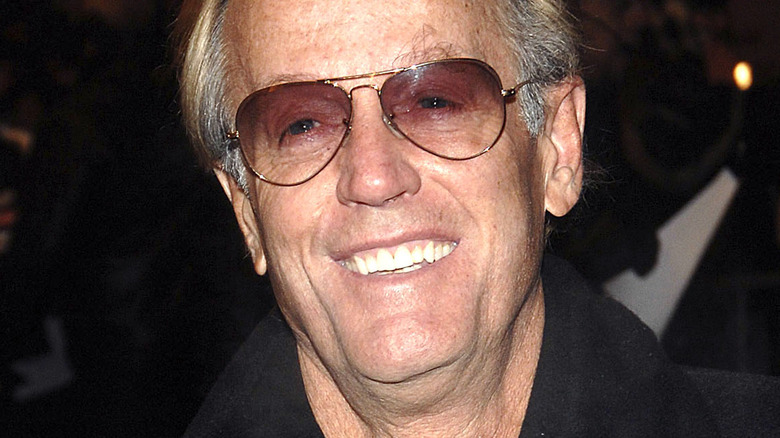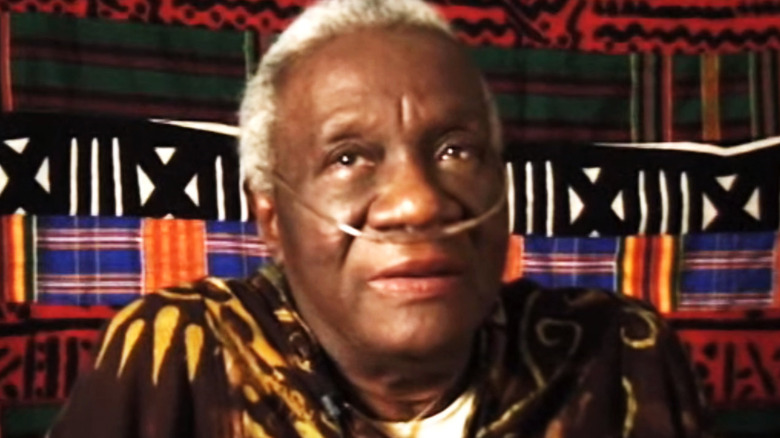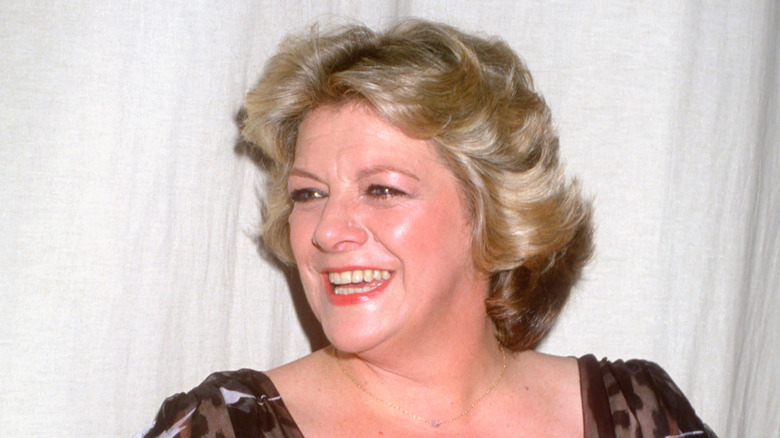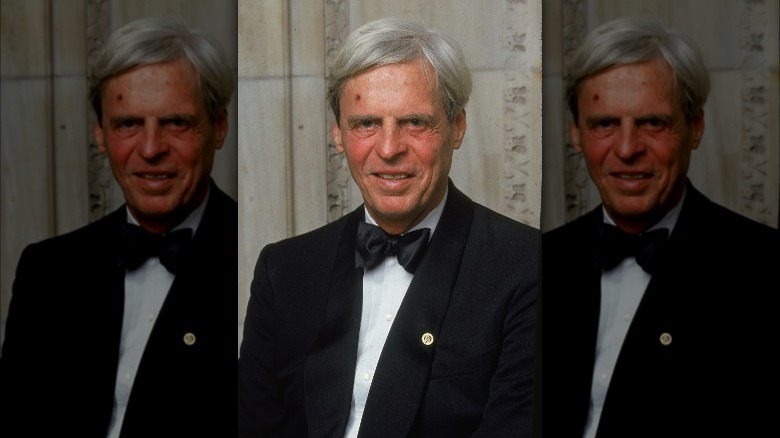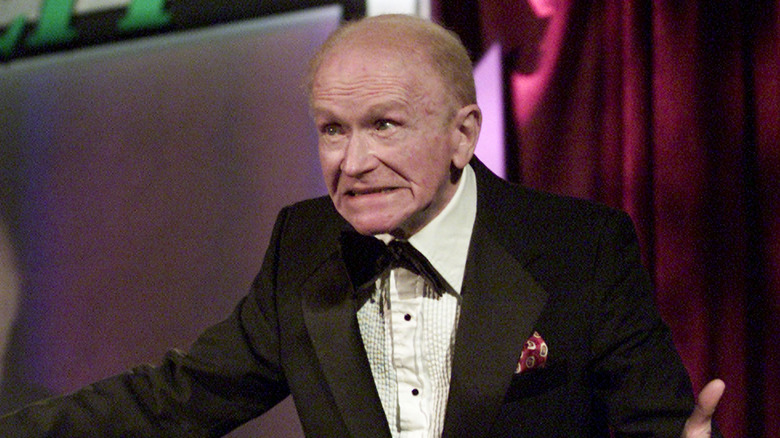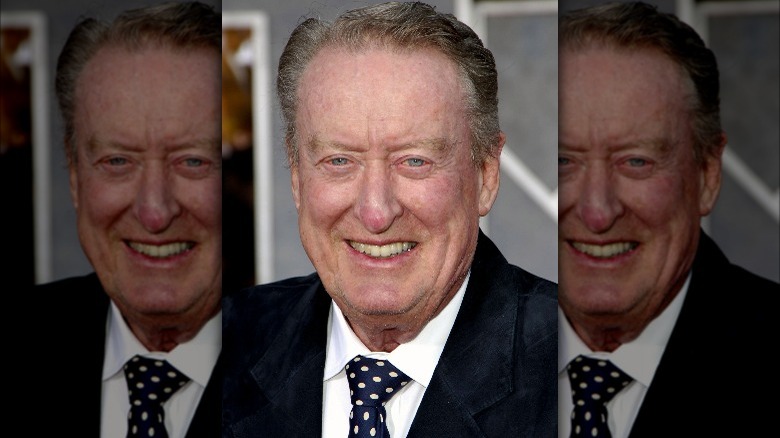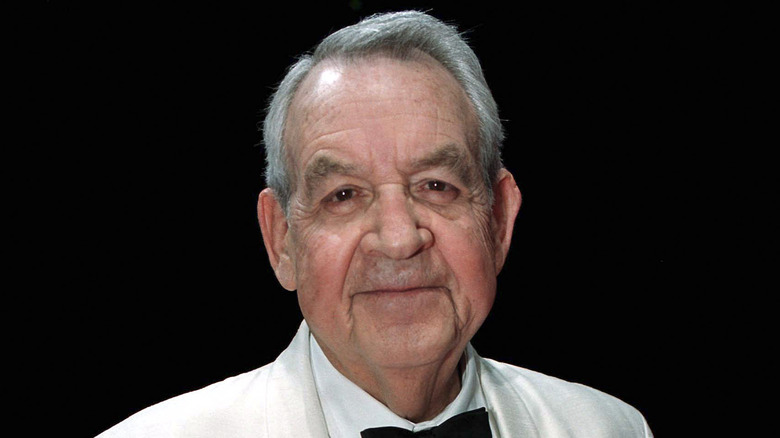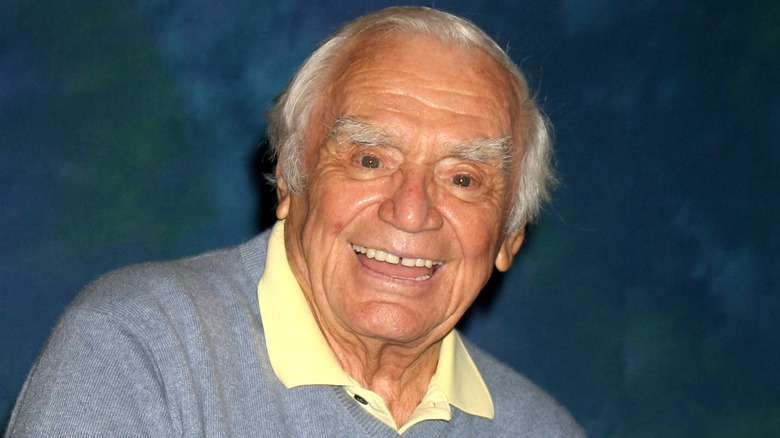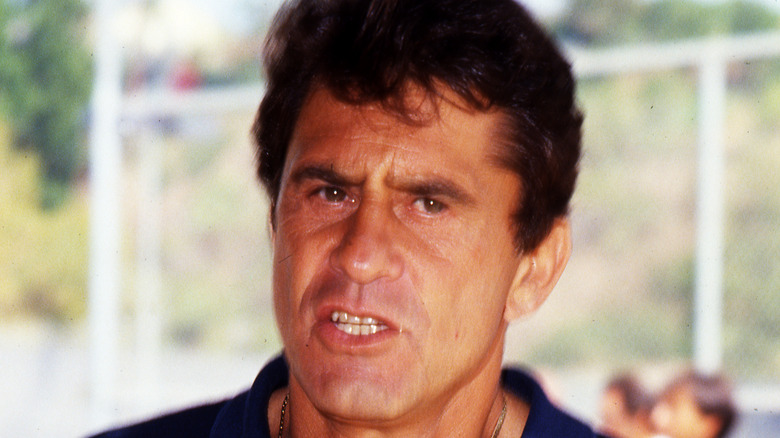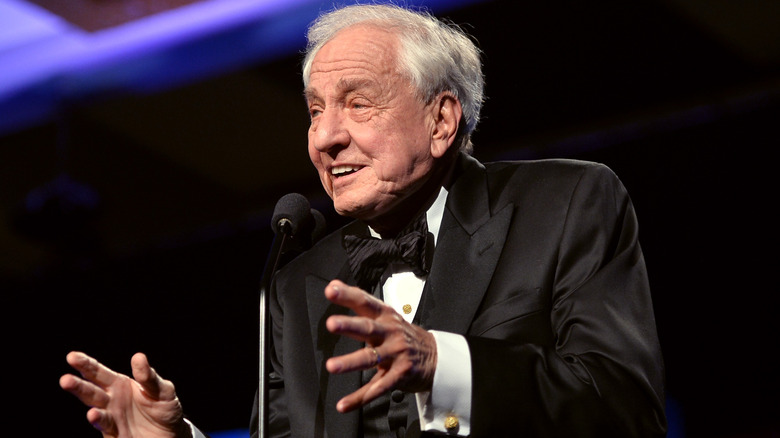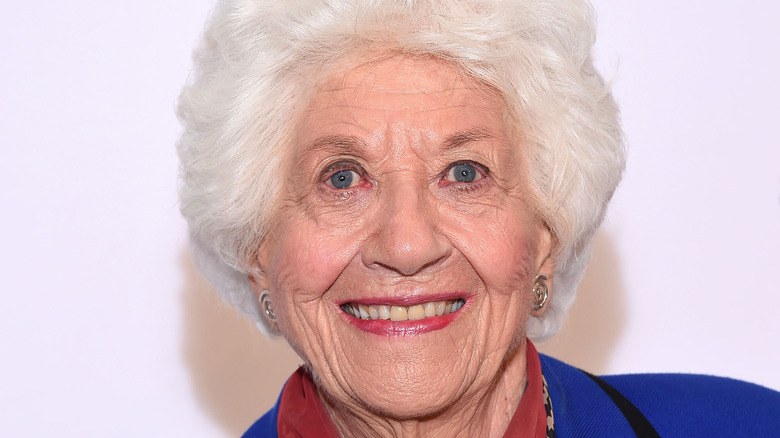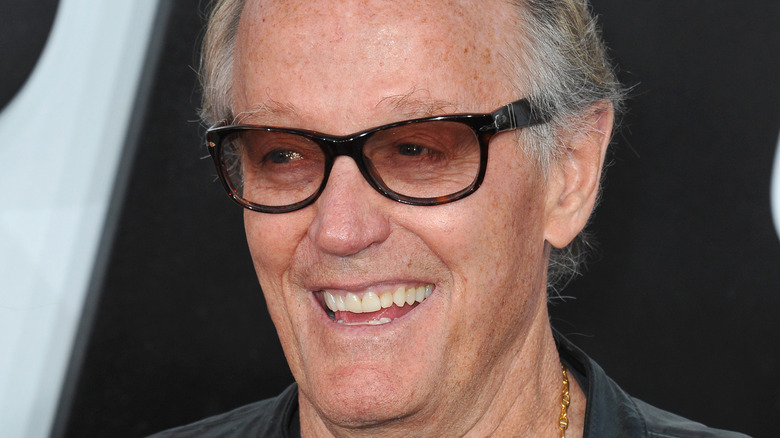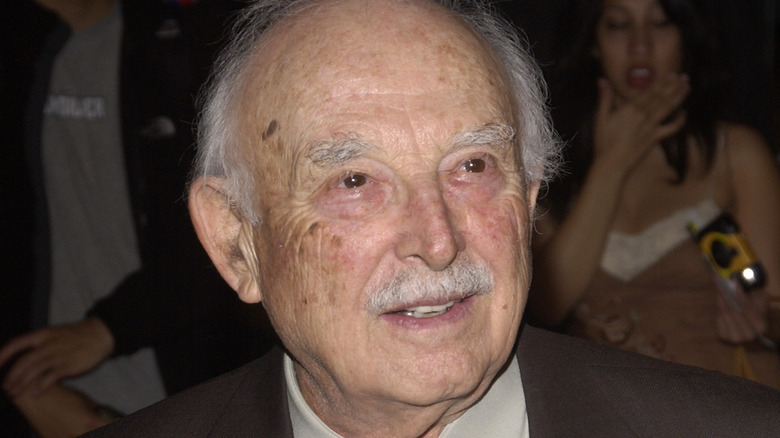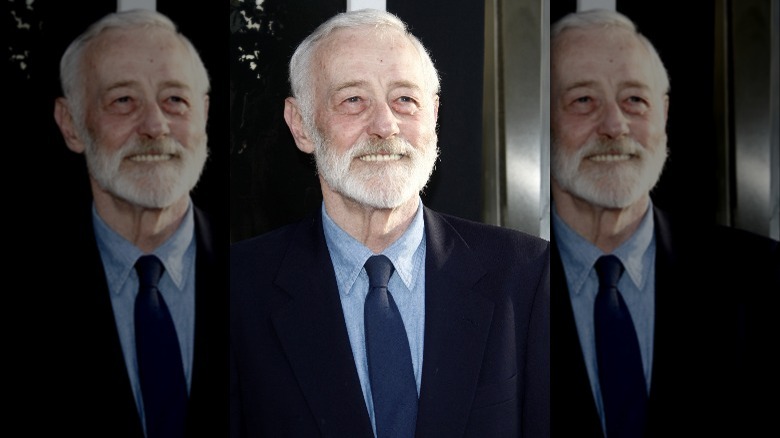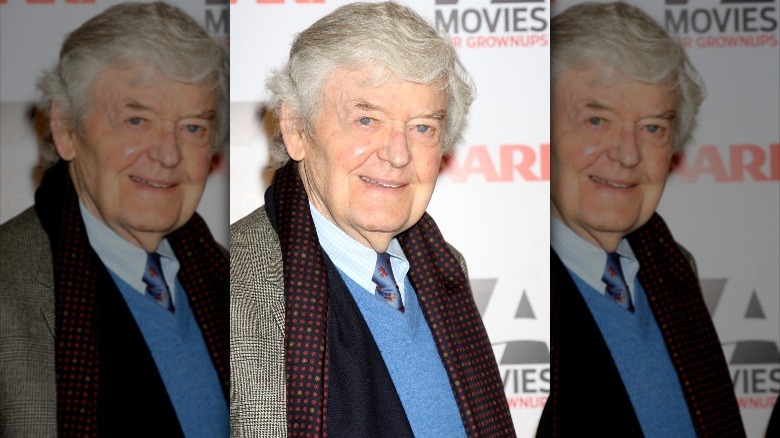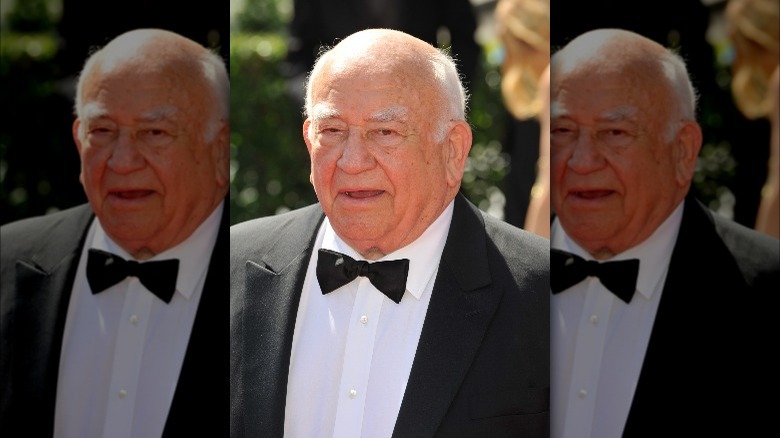Stars From ER You Didn't Know Died
Medical dramas have been a staple on primetime television for decades, but it wasn't until the '90s when hospital settings really dominated time slots, with such outings as "Chicago Hope," "Third Watch," and even 19th-century entry, "Dr. Quinn, Medicine Woman," dominating the ratings. But the runaway victor in the genre remained "ER," which launched in 1994 and surpassed its competition in the triage sweepstakes. Much of the credit had to do with the show's pacing, given that an emergency room setting warranted a rapid delivery that kept viewers attentive. The show also willingly trotted out the eye candy in the form of George Clooney, Noah Wyle, Julianna Margulies, John Stamos, and Sherry Stringfield.
"ER" has been widely touted for extending the lens to feature the Cook County Hospital staff's humanity, an ingredient that Vulture claimed wasn't merely limited to the doctors dominating the lineup. "The most radical thing about 'ER' — the element of the show that no subsequent medical show has replicated or improved upon — is that it was always also a show about nurses," wrote Kathryn VanArendon. Its photogenic players also proved their mettle after the show ended in 2009, with Clooney, Margulies, Stamos, and subsequent stars like William H. Macy and Jorja Fox ascending Hollywood's ladder toward greater prosperity. The series also enabled luminaries from Sally Field to Ving Rhames to stretch their acting chops, while a bevy of well-known actors, including some who have since died, made their own mark on this classic drama.
Beah Richards (1920–2000)
Sometimes an actor doesn't need to be a household name to garner loads of respect among colleagues, enough to score parts in groundbreaking TV and movie projects. That sums up the legacy of Beah Richards, who earned an Oscar and Golden Globe nomination for her work in the racially charged and pivotal movie, "Guess Who's Coming To Dinner?," which starred Sidney Poitier back in 1967. Richards had the fortune to star with Poitier in a prior movie, "In the Heat of the Night," that same year, tackling similar subject matter. Richards was equally adept on television, winning an Emmy a few weeks before she died of emphysema at 80 for her cameo on "The Practice." Twelve years earlier, she scored her first Emmy victory with an appearance on "Frank's Place," a short-lived sitcom that starred Tim Reid of "WKRP in Cincinnati."
Many of her portrayals involved being a matriarchal figure, and she shone on multiple episodes of "ER," playing the mother of Eriq La Salle's character, Peter Benton, who had dementia. She was far more brazen, however, on Broadway, when she played a grandmother in "Take a Giant Step" and a mother to James Earl Jones in "The Great White Hope." As an activist for equal racial rights, Richards put her soul into live productions like "The Amen Corner" and "Little Foxes." She also wrote and starred in productions like "A Black Woman Speaks," "One is a Crowd," and "An Evening With Beah Richards."
Rosemary Clooney (1928–2002)
Throughout the 15 seasons that "ER" ran, several episodes involved family members of characters in subplots that would weave their way throughout the series. But one instance turned out to be the real deal, when singer Rosemary Clooney shared screen time with her famous nephew, George Clooney. The opportunity took place during two episodes in the hospital drama's inaugural season, when she played a patient who leaves the emergency unit only to be found singing in the streets of Chicago, a role that earned her an Emmy nomination. Rosemary had already generated her own notoriety in her career, though, starting with vocalizing the sultry 1951 hit, "Come On-A My House," which led to a Paramount deal involving four pictures, including "White Christmas," per CBS News. Rosemary's recording and movie career was short-lived, however, as she soon retired after she married director and actor José Ferrer, with whom she raised five children.
They eventually divorced and Rosemary tried to stage a comeback, which ultimately failed due to her mental illness that affected her for most of her life. "Many people live in mental anguish but refuse to seek help because of the stigma attached," she once said to the Ladies Home Journal. Rosemary sadly died of lung cancer when she was 74. In a Calgary Sun interview, George credited Rosemary for him staying on the straight and narrow, saying, "My aunt taught me a lot by example about what mistakes not to make because she made them all."
George Plimpton (1927–2003)
George Plimpton had no acting background, and it's safe to say he was hardly a thespian, but he scored a few gigs in front of the camera throughout his career. Though his greater notoriety was as a Harvard-educated writer and journalist, he also made a name for himself as someone who'd get as close to the front lines of a story or sporting event as possible, wading into the middle of the action whenever he could. The former Sports Illustrated scribe and occasional Playboy magazine contributor managed to take on heavyweight boxing champion Archie Moore in a three-round match and hit the field for a few innings of Major League Baseball exhibition matches. But he was most notorious for convincing the NFL's Detroit Lions to allow him to take part in a football game for a series of downs as quarterback, an experience he related in his book, "Paper Lion." Plimpton said being on the inside gave him a journalistic advantage, "sort of intimate details that are sort of part of the fabric of professional football that reporters really don't know about," he told NPR.
Acting was far less injurious for him, and Plimpton managed to appear in two episodes of "ER" and cameoed on sitcoms like "Just Shoot Me!" and "Wings" and had several spots in "A Nero Wolfe Mystery." He also portrayed a satirization of himself on "The Simpsons," which was his final role before he died at 76 of heart problems, per The Washington Post.
Red Buttons (1919–2006)
In the first two seasons of "ER," actor and comedian Red Buttons played Jules Rubadoux, a character who blamed the loss of his wife on Dr. Carter (portrayed by Noah Wyle), a gig that would be his last before succumbing to vascular disease at 87. A veteran of upstate New York's Borsht Belt comedy scene, Buttons first drew national attention with his own TV show during the early '50s, and — after a lengthy unemployment period after the program was axed — a prominent role in the 1957 flick "Sayonara," which earned him a Best Supporting Actor Oscar. While changing entertainment trends often threatened to make him obsolete, Buttons frequently bounced back, starring in the box office smash, "The Poseidon Adventure," and guesting on the "Dean Martin Celebrity Roast" specials facilitated by NBC in the 1970s. "I've been a performer all my life," Buttons said, per The New York Times. "It's a very satisfactory profession. You get paid off on the spot. When they cheer, that's payment."
Evidently, Buttons found his profession to be so satisfactory that he worked right to the end. Besides "ER," he also scored cameos on "Roseanne," "It's Garry Shandling's Show," "Knot's Landing," and even "The Love Boat." When asked about Buttons' longevity in show business, fellow comedian and colleague Jack Carter said to the Associated Press (via Today), "Red never had an actual act. His act was his life, and that's why it came so naturally. He was brilliant at it."
Tom Poston (1921–2007)
Tom Poston was a natural as a simpleton out of his element, an attribute that got him a major break on the '50s outing "The Steve Allen Show," which scored him an Emmy. That victory boosted his stock and it wasn't long before he was in demand for such live productions as "A Funny Thing Happened on the Way to the Forum," "Bye, Bye Birdie," and "Fiddler on the Roof." But it was also a gosh-darn demeanor that endeared audiences years later to the comedic actor best remembered as George Utley, the dull-witted, but good-natured, caretaker of a Martha's Vineyard inn on "Newhart." Poston recalled the experience on Lincoln, Nebraska's KOLN/KGIN-TV: "After we started doing the show, [producers] didn't want [Utley] to be so totally inept. And they thought it would be kind of jokey and hokey, so they pulled way back on that."
His vacuousness came in handy on other sitcoms as well, including "Will & Grace," "That '70s Show," "Murphy Brown," and "Grace Under Fire," where he enjoyed a supporting role as Floyd Norton. He also came close to the Utley character when he played a school custodian on "Family Matters." But it was during two episodes of "ER" during its seventh season where viewers caught a different side of the actor, who originally cut his teeth in drama via Broadway productions of "Cyrano de Bergerac" and "King Lear" back in the '50s. Poston was 85 when he died after a short illness.
Tom Bosley (1927–2010)
During two episodes of "ER," Tom Bosley paired up with "Newhart" star Tom Poston to play a couple of sardonic seniors, a scenario that might have been out of character for someone who portrayed one of the most reasonable TV dads in pop culture history. To fans, Bosley was "Mr. C," aka Howard Cunningham, the kind, yet grounded, patriarch on the retro comedy, "Happy Days." Revisiting a post-war period when rock 'n' roll was in its infancy, the '70s sitcom placed Cunningham as a moralistic, yet amenable, guiding force to the more youthful and restless characters, from his son Ritchie to flamboyant mechanic Arthur Fonzarelli. More than a decade later, Bosley would play an entirely different father, a priest with a thirst for solving crimes in the drama, "Father Dowling Mysteries."
He'd often play reminders of his "Happy Days" role, including a guest appearance on yet another retro sitcom, "That '70s Show," and a satirized Mr. C cameo on "Family Guy." But to colleagues, he was a model actor and human being. "A great father and husband, and a wonderful artist, Tom led by example, and made us all laugh while he was doing it," Ron Howard recalled, who played Ritchie on "Happy Days," per the Los Angeles Times. "My last conversations with Tom reflected the love of life and peace of mind that he always maintained throughout his full and rewarding life. I miss him already." Bosley died at 83 of lung cancer.
Ernest Borgnine (1917–2012)
Ernest Borgnine played a grieving widower in the final two episodes of "ER" before its exit from the airwaves, a far cry from the baddies he portrayed when starting out decades ago. Because of his burly features and loud, gravelly voice, Borgnine was often cast as the antagonist in films like "The Mob" and "From Here To Eternity." That all changed in 1956, when he won the Best Actor Oscar for his heavy — yet heartfelt — work in "Marty." Just as astonishing, Borgnine was a relative unknown compared to his competition: James Cagney, James Dean, Frank Sinatra, and Spencer Tracy. "I had no idea I was ever going to win," Borgnine recalled, who had a bet with comedian Jerry Lewis for $1.98 that he'd lose. On the way to the victory podium, he handed Lewis a sock containing 198 pennies.
Borgnine's stock rose over the years, and he wound up playing tough guys with a heart of gold, including the lead in the '60s sitcom "McHale's Navy" and landing major roles in such outings as "The Dirty Dozen" and "The Poseidon Adventure." He worked regularly to the end, even providing voiceovers for 15 episodes of "SpongeBob SquarePants" before he died at 95 of kidney failure. "The industry has lost someone great, the caliber of which we will never see again," his manager, Lynda Bensky, said, via CNN. "But more importantly, the world has lost a sage and loving man who taught us all how to 'grow young.'"
James Farentino (1938–2012)
James Farentino enjoyed a three-episode arc during the third season of "ER," and it was a significant one. He landed the role of Ray Ross, the estranged father to Doug, played by George Clooney. During the '80s and '90s, Farentino was everywhere on television, almost always as a pivotal supporting character who had a significant story arc in such dramas as "Melrose Place," "Police Story," and "Dynasty." He managed to get a lead role in "The Bold Ones: The Lawyers," which launched in 1969, but the show only lasted three seasons. He fared worse as a private eye in 1972's "Cool Million," which was yanked after only five episodes. But Farentino was rewarded for some of his efforts, winning an Emmy for Saint Peter in the miniseries "Jesus of Nazareth" and a Golden Globe for a role in the film comedy, "The Pad (and How To Use It)."
According to People, Farentino led a tempestuous life, having been married four times. But the biggest headline-grabber concerned his stormy relationship with occasional girlfriend Tina Sinatra, daughter of Frank Sinatra, which saw authorities arrest him for several infractions, from badgering phone calls to restraining order violations. He also locked horns with Universal Studios, which withheld his pay every time the actor rejected movie roles he claimed were "garbage." It wasn't long before everyone in Hollywood started labeling him "Mr. Suspension." Ironically, his last job was starring in a low-budget film called "Drive/II," before he died of heart failure at 73.
Garry Marshall (1934–2016)
One of Hollywood's most versatile figures, Garry Marshall was best known for being a juggernaut creative force as a director, writer, and the producer behind such hit shows as "The Odd Couple," "Happy Days," "Laverne and Shirley," and "Mork and Mindy," all of which ruled primetime television for decades. For all that impact on pop culture, Marshall never won an Emmy Award — despite being nominated four times. When it came to movies, Marshall received little more than goose eggs for his work on successful productions that included "A League of Their Own," "Pretty Woman," and "The Princess Diaries."
Perhaps he was too busy to notice those omissions among his prolific output; it certainly explains why he seldom took on projects as an actor. Still, he managed one cameo on "ER" as a senior. He wasn't exactly a fixture on the screen, but he did manage to snare plum roles on other TV fare, including "Two and A Half Men," "Murphy Brown," and a 2016 remake of "The Odd Couple," his final contribution as an actor. While not exactly a darling among critics, The New York Times — in noting his passing from a stroke at 81 — still managed to call him a "comedy mastermind" and someone who "consistently found the sweet spot smack dab in the middle of the mainstream." More heartfelt was one tweet by "Happy Days" alum Henry Winkler, who wrote, in part, "Thank you for my professional life. Thank you for your loyalty, friendship and generosity."
Charlotte Rae (1926–2018)
Charlotte Rae was a breath of fresh air to fans of "Diff'rent Strokes" and "The Facts of Life" as caregiver and housemother Edna Garrett, first to two adopted children of a well-to-do businessman, and second at a boarding school overseeing the lives of four reluctant, but impressionable, students. Her goofiness made her endearing to viewers, although she wasn't afraid to play the morality card when topics from teenage pregnancy to alcohol abuse surfaced on the latter series. Rae first emerged in the public eye performing live theater on the small screen when television was still in its infancy, before landing roles in early TV classics like "Car 54, Where Are You?" and "The Defenders." She also landed numerous bit parts, like when she played Molly the Mail Lady during the early years of "Sesame Street." Her genre-crossing acting skills enabled her to star in four episodes of "ER" and other primetime fodder like "Sisters" and "The King of Queens." Her later years saw her venture more toward voiceover work on animated projects like "The Itsy Bitsy Spider" and "101 Dalmations: The Series."
More remarkably, Rae managed to work when she became seriously ill. She faced pancreatic cancer and later bone cancer, with the latter eventually ending her life at 92. Colleagues mourned her loss, including "Diff'rent Strokes" star Todd Bridges. "You were loved by everyone on our show and you were loved by everyone on the 'Facts of Life,'" Bridges tweeted in part. "Rest in peace, my friend."
Peter Fonda (1940-2019)
While Henry Fonda and his daughter, Jane Fonda, have long been lauded by the Hollywood establishment for their work in a bevy of blockbusters, his son, Peter Fonda, instead carved a niche for himself as an icon of the hippie counterculture during the '60s and '70s. Peter's most popular work remains the Oscar-nominated 1969 classic, "Easy Rider," which chronicled a motorcycle trip across America with two-wheeling buddy Dennis Hopper that doesn't end well for either of them. Unlike his character, Wyatt, Peter still managed to pack his rebellious following into soft-seaters with outlaw-oriented outings like "The Hired Hand" and "Dirty Mary Crazy Harry." In 1998, Peter's rebellious traits — this time as a fiercely independent beekeeper in "Ulee's Gold" — were recognized once again by the Oscar brain trust, which nominated him for a Best Actor award.
If the roles Peter picked weren't defiant, they would certainly be quirky bits, like his only guest spot in "ER" as Pierce Tanner, a man who runs into someone from his past while visiting the hospital to see his wife, the victim of a car accident. He also played a cartel heavy in "The Blacklist," and himself in the arcane David Duchovny comedy, "Californication." Peter sadly died of lung cancer at 79. In a statement (via Variety), Jane said, "I am very sad. He was my sweet-hearted baby brother. The talker of the family. I have had beautiful alone time with him these last days. He went out laughing."
Bill Macy (1922–2019)
In the latter years of his life, it's quite likely that actor Bill Macy faced the predicament of differentiating himself from another namesake, William H. Macy. When Bill Macy — best known as Walter, the long-suffering spouse to feminist Maude Findlay in the topical '70s sitcom "Maude" — died at 97, the show's producer, Norman Lear, set the record straight about the actor's legacy. "He was a rare and great comic actor," Lear said in a statement released by the AP News. "There was only one Bill Macy." It so happened that Macy had a cameo on one 2004 episode of "ER," a series that also starred William H. Macy, although the latter had left the lineup by 1998.
Bill Macy garnered sympathy from viewers opposite Bea Arthur, who played the passionate, yet aggravating, Maude in a comedy that was on the cusp of social change in the U.S. From the rise of the women's liberation movement to growing anger toward the Vietnam War, no topic seemed off limits. And if there was any peace to be had, it certainly wasn't going to be found in the Findlay household. But Macy proved himself to be anything but a wallflower in the rest of his work, from Steve Martin's "The Jerk" to the Art Carney whodunit comedy "The Late Show." Daringly, he also performed in the 1969 Off-Broadway production "Oh! Calcutta!," a show that was performed in the nude and where, interestingly, Macy met his future wife, Samantha Harper (per Variety).
John Mahoney (1922–2019)
As an actor, John Mahoney knew how to play everything straight, even as a gay character, which he portrayed in one "ER" episode from 2006. The offering, dubbed "Somebody To Love," saw Mahoney battle his partner's family over his partner's welfare surrounding a serious heart condition. It was the humanitarianism that Mahoney brought to his portrayals — especially when they clashed with the attitudes of his counterparts — that endeared him to viewers. Fans of the sitcom "Frasier" saw that element in Mahoney all the time. As disabled ex-cop Martin Crane, he used his meat-and-potatoes logic to bring his erudite sons Frasier and Niles back down to earth whenever their pretensions started to spin out of orbit. For those efforts, he earned two Emmy nominations.
Mahoney's humanitarianism may have come naturally, or the extensive training he received at Chicago's Steppenwolf Theater — where he was an onstage regular for nearly 40 years — may have helped develop the skill. The former magazine editor and English teacher eventually found his footing in New York, where he nabbed a Tony award for his work in "The House of Blue Leaves," a production that PBS later aired. In the movies, he found himself cast in father roles that exposed him to larger audiences via performances in "Moonstruck" and "Say Anything." Those patriarchal portrayals likely rubbed off on his castmates. Kelsey Grammer, after hearing of Mahoney's death from cancer complications at 77, said, per The Hollywood Reporter, "He was my father. I loved him."
Hal Holbrook (1925–2021)
In his extensive portfolio, Hal Holbrook played at least four U.S. presidents, but film-goers will likely remember him best as Deep Throat, an enigmatic White House insider who helped bring down President Richard Nixon in the political drama, "All the President's Men." His penchant for playing authority characters is legendary, earning him five Emmys, including one for the miniseries "Lincoln," and another for a televised Broadway portrayal of humorist and author Mark Twain. Still, his only Oscar nomination was for playing a kind-hearted companion to Christopher McCandless in the 2007 film, "Into the Wild."
Despite many of his lofty portrayals, Holbrook wasn't afraid to mix things up, like when he portrayed a terminal cancer patient in two "ER" episodes, a retired scientist in "The Sopranos," and an Alzheimer's-plagued father of a biker in "Sons of Anarchy." His recurring appearances on sitcoms like "Designing Women" and "Evening Shade" also proved him to be equally adept at comedy. News of Holbrook's death at 95 reverberated through the acting community. "Seinfeld" star Jason Alexander tweeted, in part, "We lost another giant today," and Steven Spielberg — who worked with the actor in the movie "Lincoln" — had nothing but great things to say. "Hal was, quite simply, an American classic who brought Mark Twain and so many of our nation's most memorable characters back to life," Spielberg said in a statement, per Variety. "He was unforgettable in 'All the President's Men,' 'Into the Wild,' and so many, many more roles over the years."
Edward Asner (1929–2021)
Veteran actor Ed Asner made the most of a three-episode story arc on "ER" when he played Dr. James McNulty, who ran a street clinic. Understandably, some viewers might not have been accustomed to seeing Asner portraying a physician, given that he's far better known for playing Lou Grant, WJM-TV's hard-boiled news director on the groundbreaking '70s sitcom, "The Mary Tyler Moore Show." Beloved for the wisdom that lay beneath his crustiness, Grant found himself spun off into an eponymous hour-long drama as an editor at the Los Angeles Tribune. Playing that character in two TV series netted Asner five Emmy Awards, and the actor would win two more for prominent roles in "Roots" and "Rich Man, Poor Man." His tally of seven Emmys still stands as the most ever awarded to a male actor.
In later years, he served for two terms as president of the Screen Actors Guild and was rarely lacking for work, appearing in such popular movies as "Elf" and "Up," and several primetime and streaming shows, from "Roseanne" and "Modern Family" to "Family Guy" and "Cobra Kai." When asked by The Hollywood Reporter in what turned out to be his final interview about how he felt at 91, Asner replied, "If it weren't for my bad left leg, I would feel younger. I've got many parts that need to be bolstered and refurbished. And I haven't got time to undergo all those changes." Asner died shortly after of natural causes.

